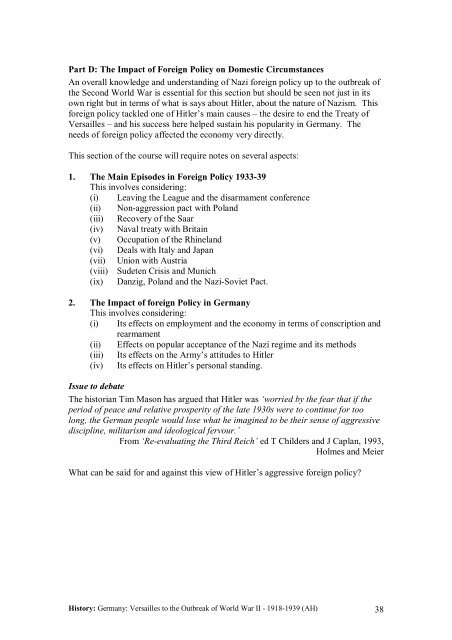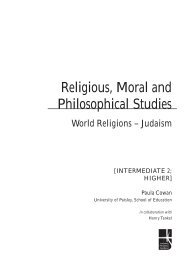PDF file: History - Advanced Higher - Germany - Education Scotland
PDF file: History - Advanced Higher - Germany - Education Scotland
PDF file: History - Advanced Higher - Germany - Education Scotland
You also want an ePaper? Increase the reach of your titles
YUMPU automatically turns print PDFs into web optimized ePapers that Google loves.
Part D: The Impact of Foreign Policy on Domestic Circumstances<br />
An overall knowledge and understanding of Nazi foreign policy up to the outbreak of<br />
the Second World War is essential for this section but should be seen not just in its<br />
own right but in terms of what is says about Hitler, about the nature of Nazism. This<br />
foreign policy tackled one of Hitler’s main causes – the desire to end the Treaty of<br />
Versailles – and his success here helped sustain his popularity in <strong>Germany</strong>. The<br />
needs of foreign policy affected the economy very directly.<br />
This section of the course will require notes on several aspects:<br />
1. The Main Episodes in Foreign Policy 1933-39<br />
This involves considering:<br />
(i) Leaving the League and the disarmament conference<br />
(ii) Non-aggression pact with Poland<br />
(iii) Recovery of the Saar<br />
(iv) Naval treaty with Britain<br />
(v) Occupation of the Rhineland<br />
(vi) Deals with Italy and Japan<br />
(vii) Union with Austria<br />
(viii) Sudeten Crisis and Munich<br />
(ix) Danzig, Poland and the Nazi-Soviet Pact.<br />
2. The Impact of foreign Policy in <strong>Germany</strong><br />
This involves considering:<br />
(i) Its effects on employment and the economy in terms of conscription and<br />
rearmament<br />
(ii) Effects on popular acceptance of the Nazi regime and its methods<br />
(iii) Its effects on the Army’s attitudes to Hitler<br />
(iv) Its effects on Hitler’s personal standing.<br />
Issue to debate<br />
The historian Tim Mason has argued that Hitler was ‘worried by the fear that if the<br />
period of peace and relative prosperity of the late 1930s were to continue for too<br />
long, the German people would lose what he imagined to be their sense of aggressive<br />
discipline, militarism and ideological fervour.’<br />
From ‘Re-evaluating the Third Reich’ ed T Childers and J Caplan, 1993,<br />
Holmes and Meier<br />
What can be said for and against this view of Hitler’s aggressive foreign policy?<br />
<strong>History</strong>: <strong>Germany</strong>: Versailles to the Outbreak of World War II - 1918-1939 (AH) 38
















